-
Athletigen
review on August 23, 2016
by Craig Macpherson

At a Glance
Summary
In summary, the Athletigen athletic report was a great way to use the DNA data I had already paid 23andMe to produce. The ease of use, realistic and implementable recommendations, as well as wide range of results are very impressive.
The sections in the report are clear, useful and detailed, but I’d say they’re most effective for those who know what they want to focus on. Perhaps a few more graphics that let you see information ‘at a glance’ would help those who don’t know where to start.
A highlight for me was the way in which the science was explained with excellent clarity and was clearly linked to each result. In addition, any comments I had were far from critical issues, merely things that would improve what is already a great service. I would recommend the Athletigen to anyone interested in improving their fitness routine.
Full Review
Athletigen were offering me the chance to process my 23andMe data to produce a report aimed at helping me become a stronger and faster athlete. They offered me the opportunity to take a DNA test to procure their service, but as I already had my DNA data, I chose to get the report straight away.
This is one of an increasing number of tools that allows you to input your data obtained from previous DNA tests to gain new insights, and this is the first of these tools that we’ve reviewed. We couldn’t wait to see how it would compare!
Product Expectations
The Athletigen website explained that the company is focussed on exploring the DNA of athletes, to improve performance and research the impact genetics has on human health. There wasn’t a huge amount of information on what the service would provide, with no specifics on what the report would include. It was made clear, however, that it was not a service that could be used for Talent Identification (which sports would I excel at?) and that it was not a definitive assessment of someone’s abilities, as environmental factors, as well as undiscovered genetic and biological factors play equally important roles in determining this.
It was also made clear that there was the option to either provide a DNA sample to Athletigen or to use data obtained from 23andMe or AncestryDNA, with each option sharing equal coverage on the main page.
Signing up experience
In order to use the service, it was necessary to sign up as a member of Athletigen. This process couldn’t have been easier, requiring only an email address and password - the option of signing up to the newsletter and blog posts was an opt-in instead of an opt-out. Once the email and password was set up, two questions guided me to the right destination: ‘Are you registering an Athletigen DNA Kit?’ and ‘Have you had your DNA tested already?’. I answered ‘no’ to the first and ‘yes’ to the second, and was directed to upload my data. This was again quick and easy, with the option to either upload directly from my computer or through the 23andMe/AncestryDNA websites.
One thing I’d point out is that I decided to change my password after signing up (I’d given my login details to a friend to check out my results) but annoyingly, Athletigen don’t let you change your password!
Results
Once I’d uploaded my data I was taken to my report which was produced amazingly quickly and was very comprehensive.
Results section: Nutrition, Athletics and Weightlifting
The results themselves were organized into three main sections: ‘Nutrition’, ‘Athletics’ and ‘Psychology’, which were displayed on the initial ‘DNA Dashboard’ page as a Venn diagram (shown below). This set out how the results were categorized and it was fun to have a colorful visual summary of my results.
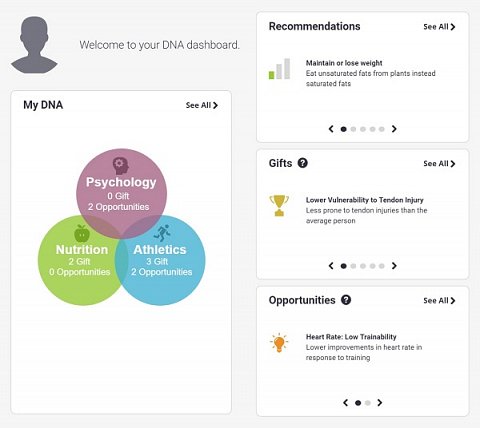
The DNA Dashboard page.
Once I got into the actual report, which was easy to access from the DNA Dashboard page (via the ‘see all’ option on each summary) the results were displayed across two tabs, labelled ‘My DNA’ and ‘Recommendations’. The former displayed the traits that I was likely to exhibit according to my DNA, and the latter provided recommendations for how best to manage these traits.
The Nutrition, Athletics and Psychology categories were each split into the sub-categories: ‘Response to food’, ‘Injury’, ‘Weightlifting’, ‘Metabolic Conditioning’, ‘Stress’ and ‘Mental Game’. I’m not sure that these were really necessary as they didn’t add any information that wasn’t already obvious, and they weren’t prominent enough on each page to encourage me to make use of them. That said, if you were interested in one of those specific aspects of training, then I imagine these sub-categories would provide a good way to quickly access the relevant results, and subsequently focus on targeted improvements to your workout.
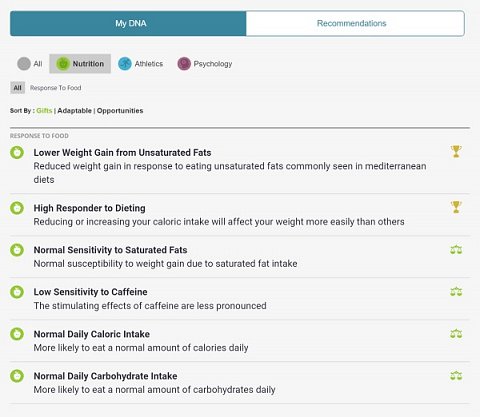
The list of my ‘My DNA’ results.
One specific result that I found particularly interesting was that, according to my DNA data, I am genetically predisposed to have a low sensitivity to caffeine (shown below). The recommendation was much more specific than I expected, giving exact times at which consuming caffeine would most effective. I was further impressed by the detailed information provided about each trait, under headings such as ‘How does this affect my training?’ and ‘Why am I less sensitive to caffeine?’.
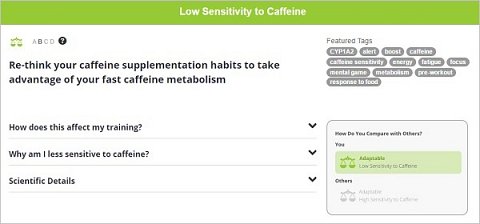
My caffeine sensitivity result.
The aspect that I was most pleasantly surprised by was the amount of clarity and detail provided in terms of the science behind the results. It was made very clear how Athletigen had come to the conclusions they had, and why the recommendations were what they were. This made the results feel all the more significant, and the technical details were explained in a way that was not just easy to understand, but also interesting. The addition of the scoring system was perhaps my favorite feature. It rated the research backing each conclusion on a scale of A-D (A= strong evidence, D = weak evidence) according to how many relevant studies had been carried out and how many subjects were included in each. This significantly increased my trust in the results and the company as a whole. It gave me a sense of how seriously to take each of the recommendations, and aided in deciding which opportunities to prioritize working on.
Results section: Gifts, Opportunities and Adaptable Traits
Another way in which the results were organized was through rating each as either a ‘Gift’, ‘Opportunity’ or ‘Adaptable’. This provided a way to see the specific skills I’m naturally gifted in and the areas where I could improve, according to my DNA. The main issue with these was with how clear the titles were, as I first thought that ‘Gift’ meant an offer which would help me to improve a skill, before realizing that it meant a natural strength in this area. This confusion may be avoided by making the explanations a little more obvious at the beginning of the report. There were tooltips next to each ‘Gift’, ‘Opportunity’ and ‘Adaptable’ summary on the DNA dashboard, but perhaps showing a short explanation for each would make the system clearer from the outset.
Fortunately, there was a pop-up explanation of Gift, Opportunity and Adaptable traits within each section (shown below), which also outlined the scoring system for scientific research (with each rated A-D). These were easy to understand, and it was great that the trait icons next to each result were a different shape and color, making it easy to interpret at a glance, and giving me another way to prioritize what I investigated first. Another effective aspect of this system was that rather than describing traits such as ‘Higher weight gain from saturated fats’ as weaknesses, they were described as opportunities, presenting them as positive aspects to optimize your diet and fitness routine to. However, this again wasn’t obvious at first and would benefit from a more prominent explanation at the beginning of the report.
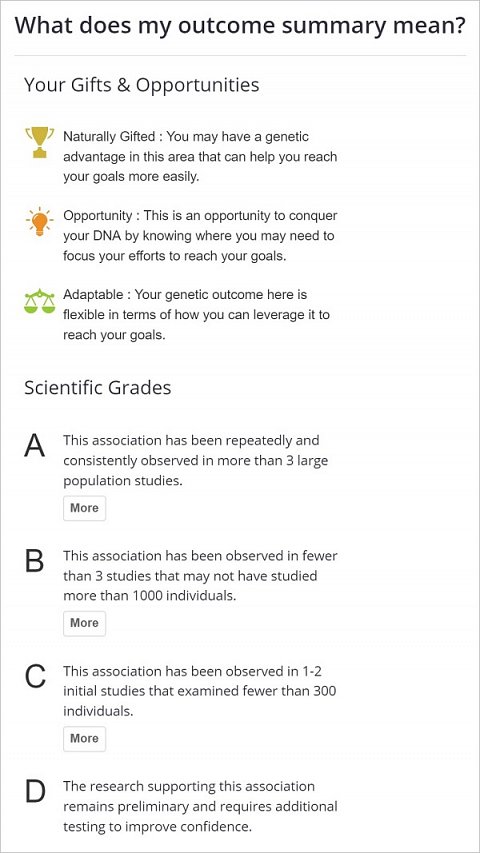
The trait explanations.
Another useful and interesting feature was the ‘How do you compare with others?’ tab, which gave the results that those with a completely different genetic predisposition may experience. This put the results in context, something which is frustratingly absent in many other DNA test results. The ‘Related Traits’ section (shown below) and ‘You might also like’ recommendations all worked well together, and provided plenty of opportunities to further explore my results and the practical means by which I could act upon them.
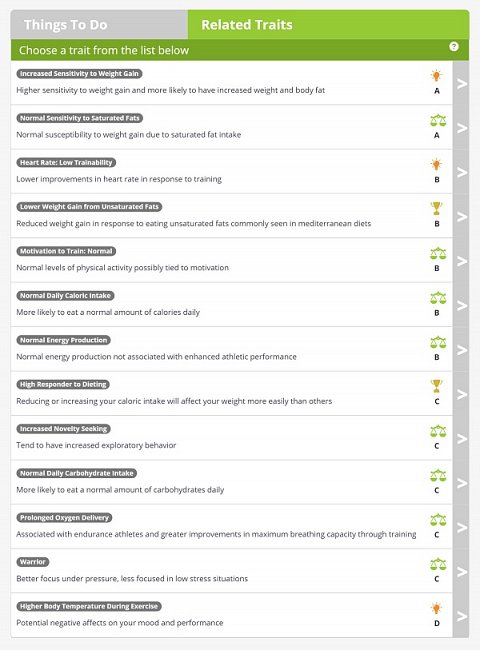
My Related Traits section.
Results section: Target Audience
It’s clear that Athletigen knows it caters for a range of customers with different needs because a ‘target audience’ is given next to each result (either ‘Beginner’, ‘Intermediate’ or ‘Advanced’). This is a great idea but I noticed that all my result recommendations were targeted at beginner or intermediate. It would have been nice to have provided information about my athletic ability up front for results tailored to my level of ability.
That said, despite following a fairly regular routine, I would definitely not describe myself as more than a casual athlete, with intermediate ability at best. I expect the majority of Athletigen’s customers would rank themselves similarly, so I can see why they’d aim most of their advice towards this target audience.
On reflection, perhaps it would have been more useful if Athletigen had split the recommendations into three sections, each aimed at a different level of athletic ability, to allow customers to quickly go to the level of advice most beneficial for them.
Summary
In summary, the Athletigen athletic report was a great way to use the DNA data I had already paid 23andMe to produce. The ease of use, realistic and implementable recommendations, as well as wide range of results are very impressive.
The sections in the report are clear, useful and detailed, but I’d say they’re most effective for those who know what they want to focus on. Perhaps a few more graphics that let you see information ‘at a glance’ would help those who don’t know where to start.
A highlight for me was the way in which the science was explained with excellent clarity and was clearly linked to each result. In addition, any comments I had were far from critical issues, merely things that would improve what is already a great service. I would recommend the Athletigen to anyone interested in improving their fitness routine.
Visit Athletigen to learn more about this DNA testing service >


